Michael Sheen Frost Nixon Interview
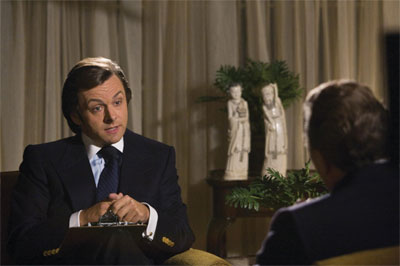
MICHAEL SHEEN TAKES ON DAVID FROST.
EXCLUSIVE Michael Sheen, Frost/Nixon Interview by Paul FischerMichael Sheen is no stranger to playing often iconic, real-life characters, notably Tony Blair [twice] and now British journalist and celebrity David Frost. He played the part firstly on stage and now he's on the big screen in a film that is already being tipped to take out some major awards come Oscar season. The actor spoke exclusively to Paul Fischer.
QUESTION: First of all, how surprised were you, when they decided to make a movie of this, that they went to the original stage production's actors to do this?
MICHAEL SHEEN: Well, I mean, as far as I know, that's very rare if it happens at all, you know? Peter Morgan, who wrote the play, who I work with a lot, did a great job and he said from the beginning that he wanted me to do the film. As grateful as I was for that, we all knew that the vagaries of the film industry would mean that I wouldn't end up doing it, no matter whether Peter wanted me to or not. But, he was as good as his word. And Ron Howard said that he would respect that. And he wanted me to do it, and that Ron from the beginning wanted me and Frank to do it.
QUESTION: When you did the play originally, how much did you immerse yourself into the character of David Frost? I mean, how extensive was it?
MICHAEL SHEEN: Well, I do as much as I possibly can with all of these real-life characters that I've played. I watch everything I can watch, read everything I can read. But ultimately, my responsibility is to the story. I see things that I find out about the person that helps the narrative, because I'm not playing the real Frost. I'm playing a character called David Frost, in this story written by Peter Morgan, even thought certain things are the real Frost. There are other elements that I leaned on very heavily, [in order to help the story.
QUESTION: Did you go out of your way to avoid meeting David, or did you end up meeting him?
MICHAEL SHEEN: Well, Peter, very early on, when we were rehearsing the play, said he thought it would be a good idea for me not to meet him, and eventually I saw the wisdom in that, because then once I'd met Frost - David's an incredibly charming, likable man. I think if I'd met him too early in the process, maybe I would have resisted going down a certain path, in terms of my exploration of the character. So I'm glad that I did meet him after a while. I'd fully explored who this character was without really worrying about what effect it would have on our relationship.
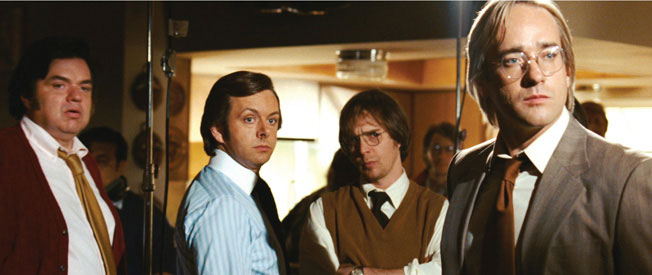 QUESTION: I guess the physicality of this character is really in his voice and his physical mannerisms. Are those the areas that you worked on, and then you explored in more detail other aspects of this character?
QUESTION: I guess the physicality of this character is really in his voice and his physical mannerisms. Are those the areas that you worked on, and then you explored in more detail other aspects of this character?MICHAEL SHEEN: I tried to do all those together, really. The way someone expresses themselves through how they speak, how they sound, and what physical mannerisms they have - it's always an expression of what's going on underneath. Like some of that is I was just planning to do that certain view of the sense of Frost that people - you want people to have of him, but then other things that I'm more interested in, in a way, are the things people do without realizing they're doing them. So the - the things that maybe an impersonator would pick up on are not what I'm looking for. I'm looking for things that will reveal what's going on within, as opposed to making a copy of what's going on on the surface. So it's not like I watch them, in order to copy.
QUESTION: You presumably looked at the original interviews. When you looked at the original interviews, what struck you the most about David Frost and Richard Nixon?
MICHAEL SHEEN: Well, I didn't watch the original interviews that many times. I mean, I watched them enough to get a sense of what was going on between them, and to get a real sense of Frost right in that moment, But I didn't want to get too locked in how he asked the questions, because, for dramatic purposes in the film, we have to do them differently to how they did them. We don't say anything they didn't say, but there's a different sort of dramatic feel to what we're doing, so I didn't want to get too locked into how they actually asked the questions. I definitely got a sense of Frost trying to put Nixon at ease. Frost obviously had done a lot of research, and had a great team around him, but he seems very knowledgeable. He seems very up on the facts, and the history and the record. I think that put Nixon at ease a bit, as well, for a lot of the interviews. Then in the Watergate section, Frost was just not going to let him get away with it and pushed him and pushed him and pushed him, and brought out a side of Frost's character that was much more prevalent, I suppose, earlier in his career. That was what I watched, mostly. In my research, I watched footage of Frost earlier on, when he was with That Was the Week That Was, when he had a reputation for being much more edgy and sharp and really putting people to task. That steeliness that was there much more obviously in the early days, I wanted to bring into the Watergate interview.Because I wanted the sense of that - that steeliness, and that edge, to be there all the time, underneath the more relaxed, affable, charming character as well.
QUESTION: Given recent political events in this country under the Bush Administration, it seems to me that if there's a theme of Frost/Nixon now, it is that nothing much has changed in the last three decades. And I know where Ron's own political allegiances lay. Do you think that's the case? Or do you think that audiences won't read too much into it?
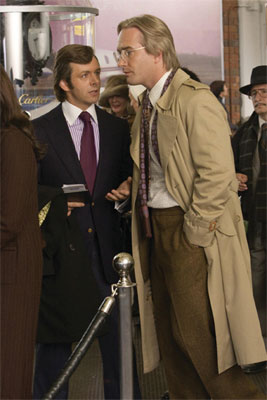 MICHAEL SHEEN: I think in some ways, there's absolutely no way you'd get a political administration, a political figure like Richard Nixon to agree to do a series of TV interviews with no editorial control. There's no way. I also think that the way that politics has been shaped by the media has changed a lot at this time. it's been interesting doing a lot of the publicity for this film, whilst the election campaign has been going on here and watching, just sort of seeing how much media has affected politics in the three decades that have happened. Where - we've researched for the film, that Nixon and JFK, the Presidential debates, it was the first time they televised that.
MICHAEL SHEEN: I think in some ways, there's absolutely no way you'd get a political administration, a political figure like Richard Nixon to agree to do a series of TV interviews with no editorial control. There's no way. I also think that the way that politics has been shaped by the media has changed a lot at this time. it's been interesting doing a lot of the publicity for this film, whilst the election campaign has been going on here and watching, just sort of seeing how much media has affected politics in the three decades that have happened. Where - we've researched for the film, that Nixon and JFK, the Presidential debates, it was the first time they televised that.People were listening to it on the radio and some people were watching on the TV. And the people who listened to it on the radio believed that Nixon had won. The people who watched it on the TV believed that JFK had won. And that was something that changed politics in America hugely. In that it wasn't as important what you said. It was more important how you said it, because you come across as Presidential. people talked about that all the time in the election, whether someone is being perceived as being Presidential, regardless of their policies and regardless of the substance of what they're talking about, That has changed so much since the time of the interviews and in some ways, was influenced by the interviews. In that - a political figure was sort of on trial by realizing that's what he was doing. In some ways, politicians have, now, trained, primed to work with media. To not let it work against them.
QUESTION: Now I noticed that you're involved in the new Underworld movie, which is a slight departure from Frost/Nixon, I would think.
MICHAEL SHEEN: Well, yeah. It's different in some ways. It's a prequel, and it tells the story of my character, but it's different in that it's a different genre, I guess. But, I treat it as serious, and I put as much work into it
QUESTION: Is it as much fun doing a movie like that, as it is doing something that is very sort of actor-centric as a Frost/Nixon or The Queen?
MICHAEL SHEEN: Well, it's much more obviously physical and that has its own difficulties but I love working on films and I love those sorts of things. So I hugely enjoyed making Underworld and I hugely enjoyed doing Frost/Nixon. Most of the reasons why I enjoyed filming anything is being with really great people,
QUESTION: So finally, having played the former British Prime Minister Tony Blair, how pessimistic are you that Labour's stranglehold over British politics will come to an end after the next election? Do you think that it's over?
MICHAEL SHEEN: No, I don't. No. It's very interesting. In the first film, in his early years, I was playing him against his early relationship with Gordon Brown. And having done that, it's been fascinating to watch what's happened since Brown took over, and how the British public has felt very let down by him. it's going to be fascinating to see what happens in the next election. Familiarity breeds contempt, people say and we've had a Labour government now for quite a while. The Iraq War has really disgusted our people, in terms of their stomach for how Blair conducted himself. And things like- Brown seemed to have got a bit of a bump up over the credit crunch crisis, in terms of how he's handled that, but I think British politics is in a bit of a limbo period.
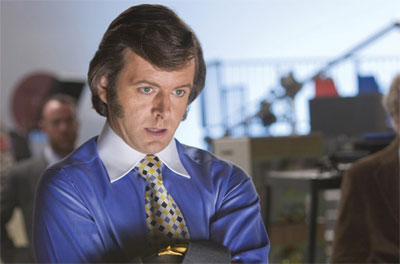 QUESTION: And what's next for you professionally, then?
QUESTION: And what's next for you professionally, then?MICHAEL SHEEN: I'm shooting a movie at the moment in LA called Unthinkable, with Samuel L. Jackson and Carrie-Anne Moss, directed by the wonderful Gregor Jordan.
QUESTION: Are you the terrorist, or are you a good guy or a bad guy?
MICHAEL SHEEN: I'm the terrorist.
QUESTION: How much fun is it playing a terrorist?
MICHAEL SHEEN: Absolutely no fun at all. It's bard, completely uncomfortable, and it's a tough shoot, but it's very enjoyable to be working with Gregor, and a really great script, so I'm excited about how it's going to turn out.
QUESTION: What nationality is this terrorist?
MICHAEL SHEEN: He's American.
QUESTION: So one of the few times you can get into an American character.
MICHAEL SHEEN: That's right, yeah. I'm really enjoying that. It's sort of the first proper full-on American character I've played.
QUESTION: Now, they're talking about Oscar nominations for Frost/Nixon. Do you take any of that seriously?
MICHAEL SHEEN: I mean, it's great if people talk about it. It's fantastic course, it means that more people will get to see the film, and there'll be more interest in the film, but I try to keep a healthy distance between myself and that stuff.
QUESTION: Are you prepared to do all the sort of nonsense that one has to do to lead up to Oscar season? I mean, awards season?
MICHAEL SHEEN: Well, I did all that for The Queen, and I did it with Music Within, so anything that helps the film.
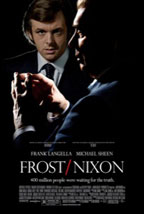
Frost/Nixon
Starring: Frank Langella, Michael Sheen, Rebecca Hall, Toby Jones, Matthew MacFadyen, Kevin Bacon, Oliver Platt, Sam RockwellDirector: Ron Howard
Genre: Dramas
Runtime: 2 hrs 2 mins
Oscar«-winning director Ron Howard brings to the screen writer Peter Morgan's (The Queen, The Last King of Scotland) electrifying battle between Richard Nixon, the disgraced president with a legacy... Oscar«-winning director Ron Howard brings to the screen writer Peter Morgan's (The Queen, The Last King of Scotland) electrifying battle between Richard Nixon, the disgraced president with a legacy to save, and David Frost, a jet-setting television personality with a name to make, in the untold story of the historic encounter that changed both: Frost/Nixon. Reprising their roles from Morgan's stageplay are Frank Langella, who won a Tony for his portrayal of Nixon, and Michael Sheen, who fully inhabited the part of Frost onstage in London and New York.
For three years after being forced from office, Nixon remained silent. But in summer 1977, the steely, cunning former commander-in-chief agreed to sit for one all-inclusive interview to confront the questions of his time in office and the Watergate scandal that ended his presidency. Nixon surprised everyone in selecting Frost as his televised confessor, intending to easily outfox the breezy British showman and secure a place in the hearts and minds of Americans.
Likewise, Frost's team harbored doubts about their boss' ability to hold his own. But as cameras rolled, a charged battle of wits resulted. Would Nixon evade questions of his role in one of the nation's greatest disgraces? Or would Frost confound critics and bravely demand accountability from the man who'd built a career out of stonewalling? Over the course of their encounter, each man would reveal his own insecurities, ego and reserves of dignity -- ultimately setting aside posturing in a stunning display of unvarnished truth.
Frost/Nixon not only re-creates the on-air interview, but the weeks of around-the-world, behind-the-scenes maneuvering between the two men and their camps as negotiations were struck, deals were made and secrets revealed...all leading to the moment when they would sit facing one another in the court of public opinion.
Frost/Nixon is a collaboration between Imagine Entertainment and Working Title Films, with Academy Award« winners Brian Grazer and Ron Howard joining Tim Bevan and Eric Fellner as producers. Joining Langella and Sheen as the colorful real-life personalities who provide the men counsel is a formidable roster of actors including Kevin Bacon, Oliver Platt, Sam Rockwell, Toby Jones and Matthew Macfadyen.
MORE
- Viggo Mortensen The Road
- 24 Cast Reunion
- Aaron Eckhardt No Reservations
- Aaron Eckhart The Dark Knight
- Adam McKay Step Brothers Interview
- Alan Alda Diminished Capacity Interview
- Alan Alda Diminished Capacity Interview
- Alex Dimitriades
- Al Pacino Oceans 13
- Alan Rickman Snow Cake
- Alan Rickman Sweeney Todd



